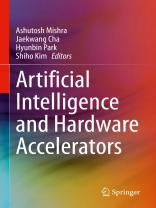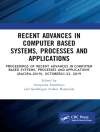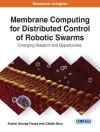This book explores new methods, architectures, tools, and algorithms for Artificial Intelligence Hardware Accelerators. The authors have structured the material to simplify readers’ journey toward understanding the aspects of designing hardware accelerators, complex AI algorithms, and their computational requirements, along with the multifaceted applications. Coverage focuses broadly on the hardware aspects of training, inference, mobile devices, and autonomous vehicles (AVs) based AI accelerators
Daftar Isi
Introduction.- AI Hardware Accelerators.- AI Accelerators for Standalone Compute.- AI Accelerators for Servers and Cloud Applications.- AI Accelerators for Configurable Hardware.- Hardware Architecture for Smartphones.- Software and Benchmark for Smartphones.- Hardware Accelerators for Autonomous Vehicles.- Hardware Accelerators in Embedded Systems.- Processing-In-Memory based Hardware Accelerator.- Emerging CNN Hardware Architectures for Energy-efficient AI.- Neuromorphic Hardware Accelerators.
Tentang Penulis
Ashutosh Mishra has received his B.Tech. degree in Electronics and Communication Engineering from Uttar Pradesh Technical University Lucknow, India, in 2008. He completed his master’s in Microelectronics & VLSI design from the National Institute of Technology Allahabad, India, in 2011. He has earned his Ph.D. degree in 2018 from the Department of Electronics Engineering, Indian Institute of Technology (BHU) Varanasi, India. He has worked as an Assistant professor in Electronics and Communication Engineering at the National Institute of Technology Raipur, India. He is the recipient of the Korea Research Fellowship (KRF) 2019 provided by the National Research Foundation of Korea through the Ministry of Science & ICT, South Korea. Currently, he is working as a Research faculty & Brain Pool Fellow in the Seamless Transportation Lab, School of Integrated Technology, Yonsei University, South Korea. His research interests include Intelligent systems, Autonomous vehicles, Artificial Intelligence, Convergence Technology, etc.
Jaekwang Cha received his B.S. degree from the School of Electrical and Electronics Engineering, Yonsei University in 2014. He received his M.S. and Ph.D. from the School of Integrated Technology, Yonsei University, South Korea, in 2020. He is currently working as a Postdoctoral researcher in the Seamless Transportation Lab at the School of Integrated Technology, Yonsei University, South Korea. AR/VR systems, Autonomous vehicles, Computer vision, and Artificial intelligence are his main research interests.
Hyunbin Park received his B.S. degree from the School of Electrical and Electronics Engineering, Yonsei University in 2013. He received his M.S. and Ph.D. from the School of Integrated Technology, Yonsei University, South Korea, in 2019. He has also worked as a Postdoctoral researcher at the School of Integrated Technology, Yonsei University, after obtaining his Ph.D. degree. Currently, he isworking as Staff Engineer in Samsung Electronics, South Korea. He is expertise in the design of Inference accelerators for deep neural networks, Deep learning processors inside cameras, etc. His research interests are in NPU designs for smartphones, Autonomous vehicle processors, Artificial Intelligent & Deep Learning based Hardware Accelerators, etc.
Shiho Kim is a Professor in the School of Integrated Technology, Yonsei University, South Korea. He received his B.S. degree in Electronic Engineering from Yonsei University, South Korea in 1986. He received his M.S. and Ph.D. degrees in Electrical Engineering in 1988 and 1995, respectively from KAIST, South Korea. His main research interest includes the development of software and hardware technologies for intelligent vehicles and reinforcement learning for autonomous vehicles. He is a member of the editorial board and reviewer for various Journals and International conferences. So far, he has organized two International conferences as Technical Chair/General Chair. He is a member of IEIE (Institute of Electronics and Information Engineers of Korea), KSAE (Korean Society of Automotive Engineers), vice president of KINGC (Korean Institute of Next Generation Computing), and a senior member of IEEE. He is the co-author for over 100 papers and holds more than 50 patents in the field of information and communication technology.












